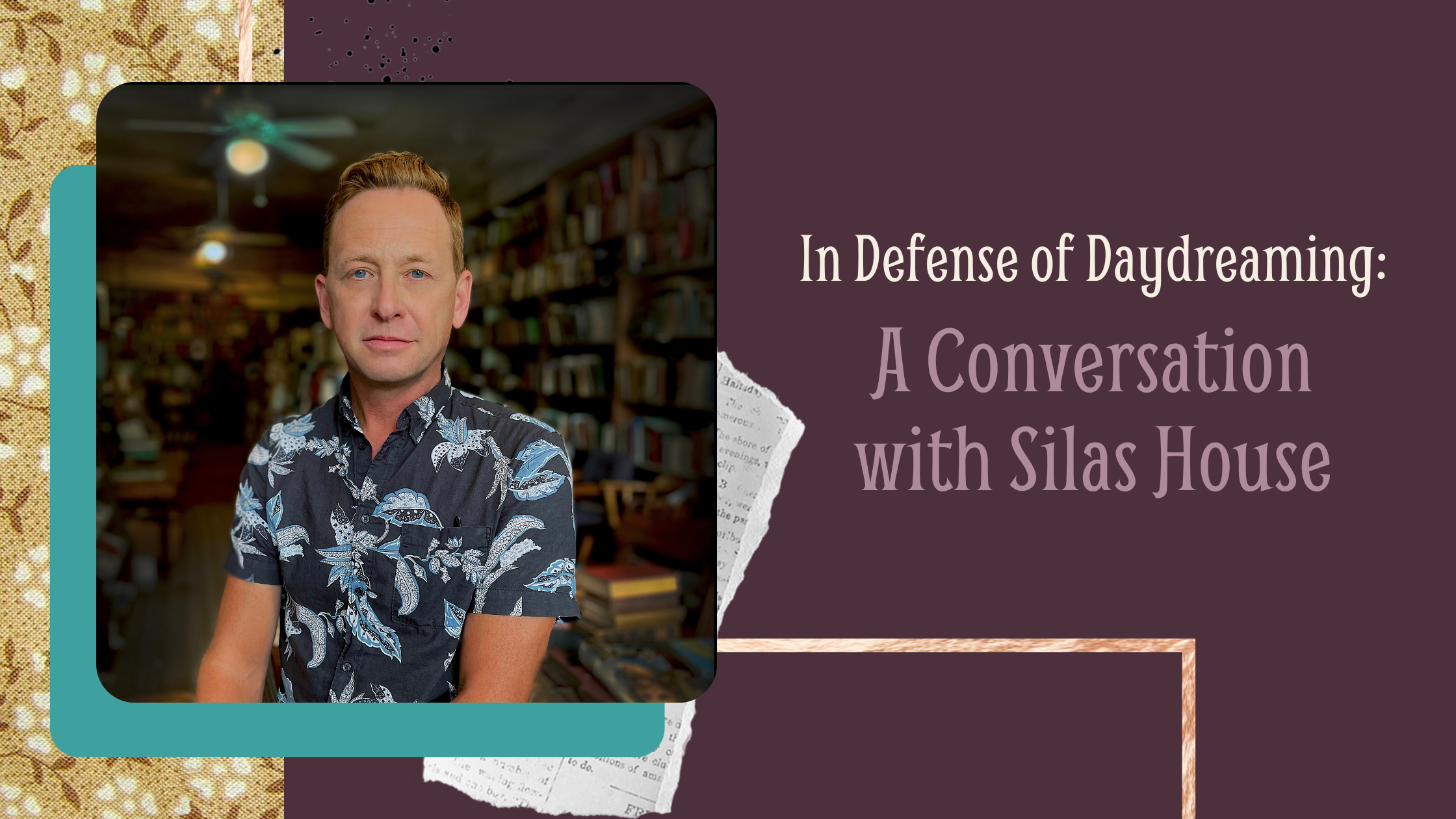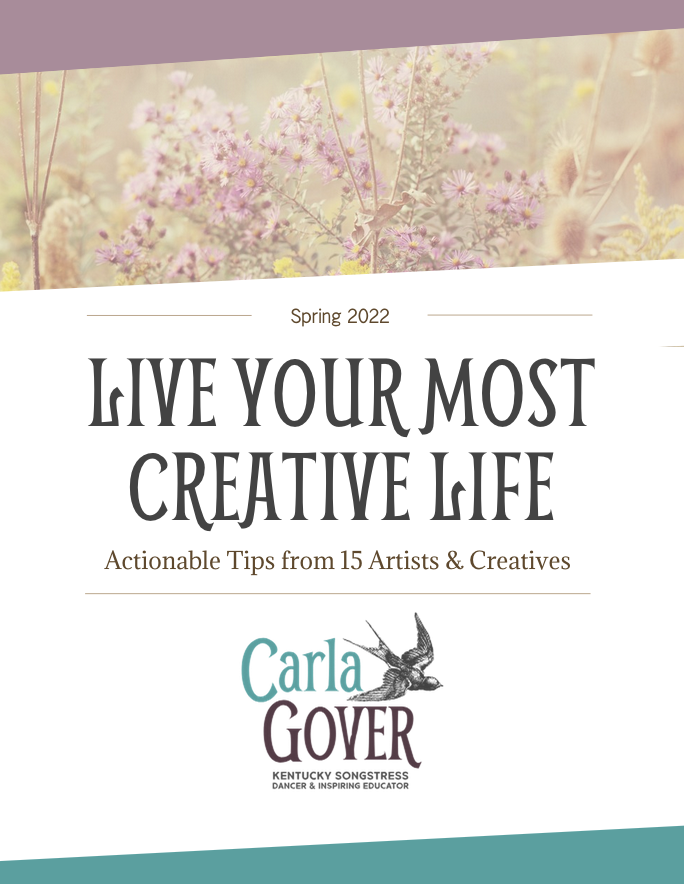In Defense of Daydreaming: A Conversation with Silas House (podcast)

In Defense of Daydreaming: An Interview with Silas House
Listen now or read the overview below.
How Kentucky’s Poet Laureate balances creativity, deadlines, and the sacred art of doing “nothing”
When you’re juggling teaching, writing novels, serving as state poet laureate, and collaborating with Grammy-nominated musicians, how do you keep all the balls in the air? And perhaps more importantly, how do you know when to let them drop?
Author Silas House has built a remarkable career while staying grounded in his Eastern Kentucky roots. In this candid conversation, he opens up about productivity systems, representation, fear as creative fuel, and why sitting in a field of wildflowers isn’t laziness—it’s essential creative work.
The Daily Practice: Lists, Priorities, and Permission to Rest
House starts each morning the same way: making a prioritized to-do list. But here’s the twist—he doesn’t beat himself up when everything doesn’t get checked off.
“I feel like a juggler most of the time,” House admits. “The main thing is every morning I get up and prioritize what’s gonna happen that day. Often, I don’t get that list done when I think I’m going to. But you know, you just do the best you can with it.”
His secret weapon? Building rest into the juggling act itself.
“I think part of the juggling act is you have 3 or 4 balls in the air that are busy, and then you’ll have one of those balls that has to be rest,” he explains. “For me, that sometimes just means going down and sitting by the creek with the dog and having a moment of stillness.”
Silas’ Practical Tips for Creative Productivity:
- Keep a bedside notebook — House writes down tasks as they come to him at night, preventing the anxiety spiral that keeps creative minds awake
- Set self-imposed deadlines — If a publisher wants something by Christmas, House aims for Thanksgiving
- Tie deadlines to holidays or big events — This creates built-in rewards and makes goals easier to remember
- Acknowledge what you accomplished — Not just what’s left undone
- Embrace simple pleasures — Ten minutes petting the dog can be deeply rejuvenating
The Appalachian Connection to Water
One interesting observation emerged from House’s teaching: Appalachian students have a unique relationship with water. During a trip to Ireland with 22 students, he noticed that his 11 Appalachian students would wade or swim at every body of water they encountered, while the other students looked on in confusion.
“There’s hardly anything better than the sound of water running over rocks,” House reflects, identifying this connection as primal—something that feeds creativity and provides necessary restoration.
Navigating Fame While Staying Grounded
House’s role as poet laureate has expanded his circle to include high-profile musicians like Tyler Childers and Wynonna Judd. Yet he maintains a remarkably down-to-earth perspective.
His philosophy? “They put their britches on just like I do,” echoing his parents’ wisdom about celebrity encounters.
However, House is refreshingly honest about where he does feel imposter syndrome: in elite literary spaces where class divisions become apparent.
“I open my mouth and I can see that people in the audience feel like as soon as I start talking, my IQ goes down for them,” he observes. “That’s easy to identify.”
Imposter Syndrome as Creative Fuel
Rather than trying to eliminate these feelings, House has learned to channel them.
“I think that impostor syndrome makes me a better artist because it makes me want to do the best I can,” he says. “I’ve always been aware that a lot of us have to work twice as hard to achieve what we wanna achieve because we did go to a state university instead of, you know, Ivy League.”
What Success Really Means
Despite Grammy nominations and literary accolades, House finds his most meaningful validation elsewhere. A woman recently told him she read his book “A Portrait of Leaves” to her dying mother during her final months.
“That’s better than any Grammy nomination,” House says simply. “It doesn’t get much better than that.”
This perspective keeps him focused on authentic storytelling rather than chasing commercial success or critical approval.
Writing What You Need to Read
When fear and resistance arise—and House acknowledges they always do—his compass is authenticity.
“I’m always writing the book that I want to read,” he explains. “I think honesty is a big part of it for me, like just trying to tell an essential truth in my writing and that will resonate.”
He points to universal themes—community, storytelling, grief—as the elements that make work resonate across diverse audiences. His novel released in 2023 became especially meaningful to readers processing pandemic-related grief, though it was written before COVID-19.
Fear as Engine, Not Obstacle
House offers a provocative reframe: “The fear is fueling the piece of art.”
Rather than something to overcome, fear becomes the adrenaline the creative engine needs. This perspective shifts resistance from roadblock to resource.
The Responsibility of Representation
As one of the few openly gay Kentuckians in the public eye, House feels the weight of representation—particularly when young queer people reach out to him.
“It just feels like a real responsibility to try to do the right thing as much as I can,” he says.
His approach focuses on presenting himself as multidimensional—not just a gay person or a country person or a person of faith, but all these things together.
“I don’t ever want to just be a gay person or a country person or a person of faith or whatever. I always want people to name me as all those things. And I’m all those things not in spite of those things, but because of all those things.”
Current and Upcoming Projects
House has several exciting projects in the works:
That Dog Won’t Hunt — A picture book about a tenderhearted beagle who refuses to hunt, much to his grandfather’s dismay
Untitled Novel — Set in early 1900s Eastern Kentucky, Lexington, and Brooklyn, exploring themes of forbidden desire and environmental devastation from the era of widespread clear-cutting. House describes it as particularly challenging since trees are “one of the saviors of my life.”
All These Ghosts — A timely and poignant poetry collection by acclaimed author and former Poet Laureate of Kentucky Silas House, including the poem read at Governor Andy Beshear’s 2023 inauguration.
Dead Man Blues: A Novel — Two grisly murders. A disgraced former mayor. A tranquil town on the verge. This gripping historical crime novel set in the South pulls the past into the present, perfect for fans of Attica Locke and Wiley Cash.
In Defense of Daydreaming
House’s parting wisdom challenges our productivity-obsessed culture:
“I think the misconception about being a creative person is that it’s something that you turn on for so many hours a day. In fact, being a creative person means that’s the way you walk through the world.”
He emphasizes that creativity requires constant observation—in the grocery store, walking through nature, everywhere. And crucially, it requires stillness.
“Sitting in that field of wildflowers, that daydreaming is still productivity. It’s not just lollygagging,” House insists. “Even when you are daydreaming, something really active is happening. That’s where the creativity happens. That’s the magic.”
Silas House is Kentucky’s Poet Laureate and the author of multiple novels including “Southernmost” and “Lark Ascending.” His work explores Appalachian identity, LGBTQ+ experiences, and environmental themes. He teaches at Berea College and has received numerous honors including a Grammy nomination.
About the Interviewer: Carla Gover hosts “What Dreamers Do,” a podcast exploring creative life and social change.

Enter your address below to get Carla’s free creativity guide, with tips from Silas and other artists and creatives on living your most creative life!
• Enjoy original songs, banjo tunes, and mountain ballad downloads from the hills of East Kentucky
• Learn the basics of mountain percussive dance in my free instructional video “3 Essential Steps for Appalachian Flatfooting & Clogging”
• Snag our video guide to making your own herbal tinctures along with homey recipes from our family!
• Stay in touch about all things Appalachia with my fun weekly email, like a front-porch visit in your inbox!
Get a hearty helping of Appalachian Goodness with your free Mountain Mama Digital Care Package!
Free Gift
Website by Tracy Raftl Design
© 2023 Carla Gover
Menu
Follow me
Carla is currently based in Lexington, KY, ancestral lands of the Adena, Hopewell, S’atsoyaha (Yuchi), Shawandasse Tula (Shawanwaki/Shawnee), ᏣᎳᎫᏪᏘᏱ Tsalaguwetiyi (Cherokee, East), and Wazhazhe Maⁿzhaⁿ (Osage) nations.
Online Press Kit
A hearty helping of Appalachian goodness with lots of tools to help you stay happy and sane, including Kentucky songs and tunes, a Flatfooting & Clogging Video Class, our guide to making your own herbal tinctures, a creativity handbook, mountain recipes, and more!